Program Management Phase of the BCM Planning Methodology for Hotel
The Program Management phase is the final phase of the BCM planning methodology for hotels.
While the BCM Plan and its associated tests and exercises are essential to ensuring a hotel’s operational resilience, the Program Management phase ensures that these efforts align with its long-term strategic goals and that continuity efforts are consistently maintained and improved.
This includes integrating BCM principles into the hotel’s overall management structure, setting up governance processes, and ensuring the continuous alignment of the hotel’s operations with resilience goals.
 Program management ensures that business continuity is not a one-time effort but an ongoing, evolving process. This phase helps ensure business continuity activities are effectively coordinated, monitored, and improved.
Program management ensures that business continuity is not a one-time effort but an ongoing, evolving process. This phase helps ensure business continuity activities are effectively coordinated, monitored, and improved.
It includes overseeing the implementation of the BCM Plan, ensuring that staff is trained, resources are available, and the plan is up to date with the latest risks, regulations, and organisational changes.
Program management also involves assigning roles and responsibilities, securing necessary resources, and integrating BCM into the hotel's culture and daily operations. This ensures that business continuity efforts become a natural part of the hotel's operations.
Effective program management also involves engaging senior leadership, monitoring the performance of business continuity processes, and ensuring that progress is consistently reviewed against the set objectives.
This ensures that the hotel can respond to potential risks and disruptions in a way that minimises impact, allows for rapid recovery, and ensures continuity of operations.
The program management phase embeds BCM principles into the hotel’s overall governance framework, supporting its commitment to operational resilience, customer service, and long-term success.
Key Elements of the Program Management Phase
Governance Structure and Leadership Engagement
A key component of the Program Management phase is establishing a robust governance structure. This structure includes defining the roles and responsibilities of the BCM team, which typically consists of representatives from key departments such as operations, finance, IT, human resources, and security.
It also involves securing the active engagement of senior management, which is critical to driving the BCM agenda throughout the hotel.
Senior leaders are responsible for allocating the necessary resources, prioritising business continuity, and overseeing the execution of BCM activities. Their support ensures that BCM is integrated into the hotel's strategic objectives, and their involvement fosters a culture of resilience.
The governance structure should also define decision-making, communication, and reporting mechanisms. Regular meetings should be scheduled to review BCM's performance, discuss potential risks, and meet the hotel’s BCM objectives.
These meetings allow for identifying new risks or challenges and provide an opportunity to adjust the program as necessary. Clear communication channels between departments and with leadership will help ensure that BCM is a shared responsibility across the hotel.
Resource Allocation and Budgeting
Program management also ensures adequate human, financial, and technological resources are allocated to support BCM activities. This includes budget planning for training, testing, exercises, and system updates.
Resources should also be dedicated to developing and maintaining critical systems and infrastructure, such as backup power supplies, data recovery systems, and emergency response tools.
The Program Management phase ensures that the hotel is always prepared by continually allocating the necessary resources to maintain business continuity, conduct regular testing, and review the plan. These resources allow the hotel to quickly and effectively respond to disruptions.
Ongoing Training and Awareness
For BCM to be truly effective, the Program Management phase includes regular training and awareness programs for staff at all levels. While some basic training occurs during the initial stages of BCM implementation, ongoing training ensures that employees are updated on their roles and responsibilities within the BCM Plan.
Training should be tailored to the specific needs of different departments and staff roles, from front-line employees to senior management.
Additionally, awareness campaigns should be conducted periodically to reinforce the importance of business continuity and keep staff engaged.
Through this ongoing training and awareness, the hotel can ensure that all employees are prepared to respond appropriately during a crisis, whether part of the emergency response team or simply helping guests navigate an emergency.
Continuous Improvement and Monitoring
A critical element of the Program Management phase is continuously monitoring and improving the BCM program. This involves regularly reviewing the effectiveness of the BCM Plan, especially after testing exercises, live drills, or actual incidents.
Feedback from these exercises should be used to refine recovery strategies, improve procedures, and address any identified weaknesses.
Monitoring also involves tracking emerging risks, hotel operational environment changes, and regulatory requirements that may impact business continuity efforts.
The program should be dynamic, allowing for adjustments based on internal and external changes. Regular reviews, performance audits, and risk assessments will ensure the hotel’s BCM program is current and adaptable to future challenges.
Integration with Organizational Culture
For BCM to be successful, it must be integrated into the hotel’s overall culture. The Program Management phase emphasises BCM principles in the hotel’s day-to-day operations and corporate values.
Senior leadership should communicate the importance of BCM to all employees, making it clear that maintaining resilience is a shared responsibility.
Regularly highlighting BCM as a priority helps reinforce its importance and ensures that employees at all levels remain committed to the program.
When BCM becomes a natural part of the hotel's culture, it enhances the organisation’s ability to withstand disruptions and recover quickly.
Summing Up...
The Program Management phase is vital to ensuring the success and sustainability of BCM at a hotel. It provides the structure, resources, and continuous oversight needed to embed BCM into the hotel's culture and daily operations.
The program management phase ensures that the hotel remains resilient and prepared to face future disruptions by establishing effective governance, allocating necessary resources, training staff, and fostering continuous improvement.
With a strong focus on leadership engagement, program monitoring, and integration into the organisational culture, the hotel can ensure that its BCM program evolves to meet emerging risks and challenges, safeguarding its operations and reputation.
More Information About Business Continuity Management Courses

 To learn more about the course and schedule, click the buttons below for the BCM-300 Business Continuity Management Implementer [B-3] course and the BCM-5000 Business Continuity Management Expert Implementer [B-5].
To learn more about the course and schedule, click the buttons below for the BCM-300 Business Continuity Management Implementer [B-3] course and the BCM-5000 Business Continuity Management Expert Implementer [B-5].
![Register [BL-B-3]*](https://no-cache.hubspot.com/cta/default/3893111/ac6cf073-4cdd-4541-91ed-889f731d5076.png) |
 |
 |
 |
 |
 |
![FAQ [BL-B-3]](https://no-cache.hubspot.com/cta/default/3893111/b3824ba1-7aa1-4eb6-bef8-94f57121c5ae.png) |
If you have any questions, click to contact us.
|
 |
 |
 |
 |


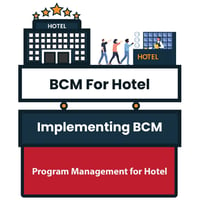
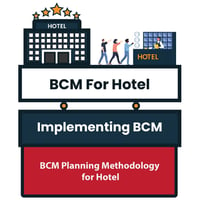
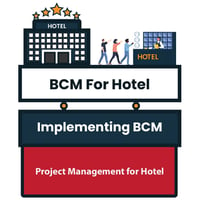
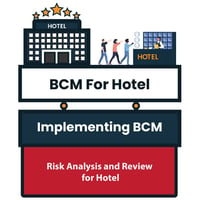
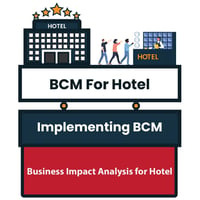
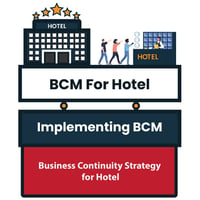
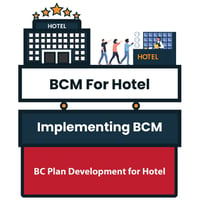
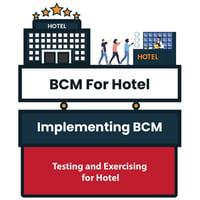
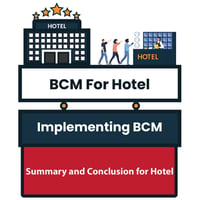
![Email to Sales Team [BCM Institute]](https://no-cache.hubspot.com/cta/default/3893111/3c53daeb-2836-4843-b0e0-645baee2ab9e.png)

